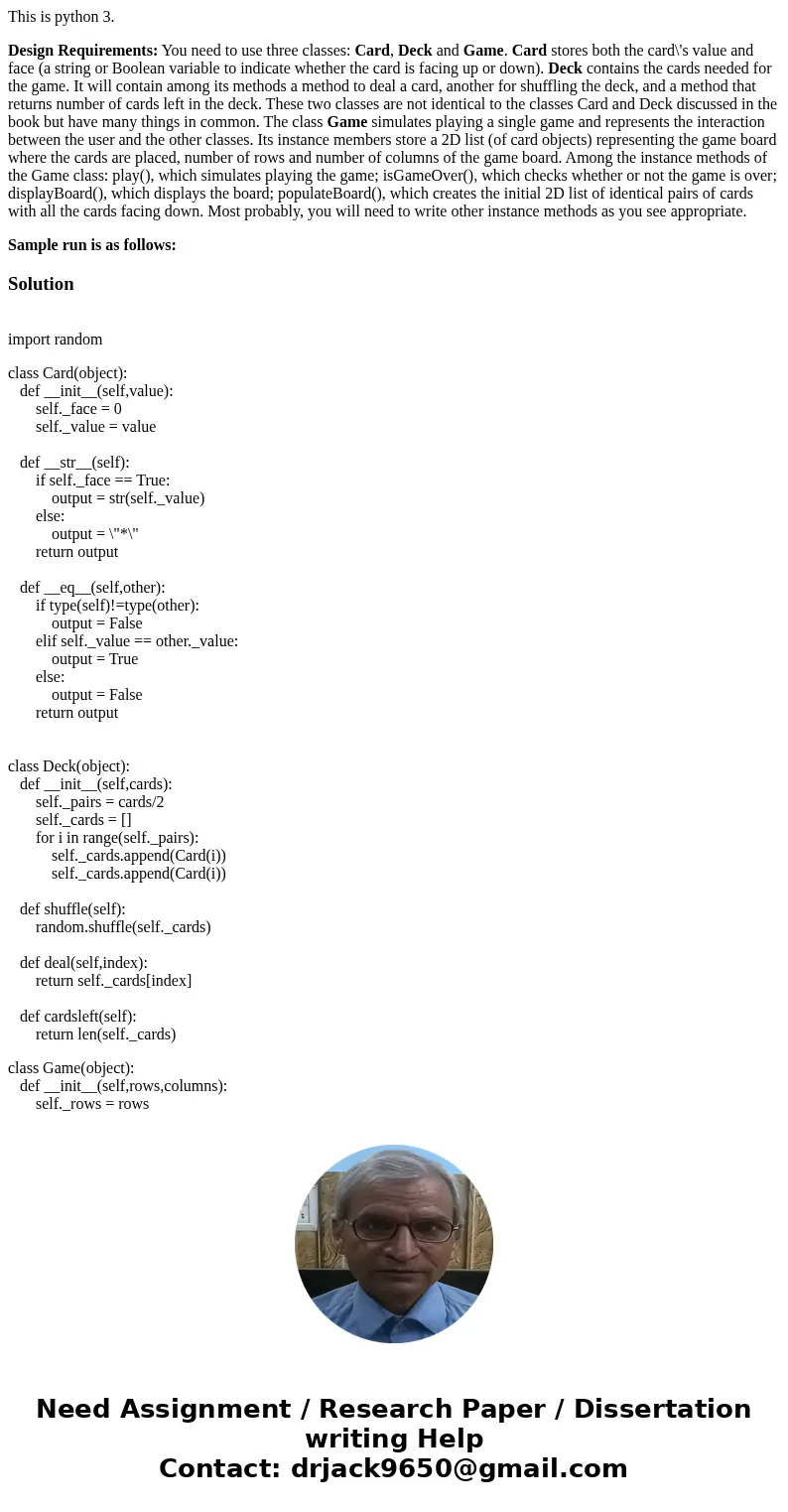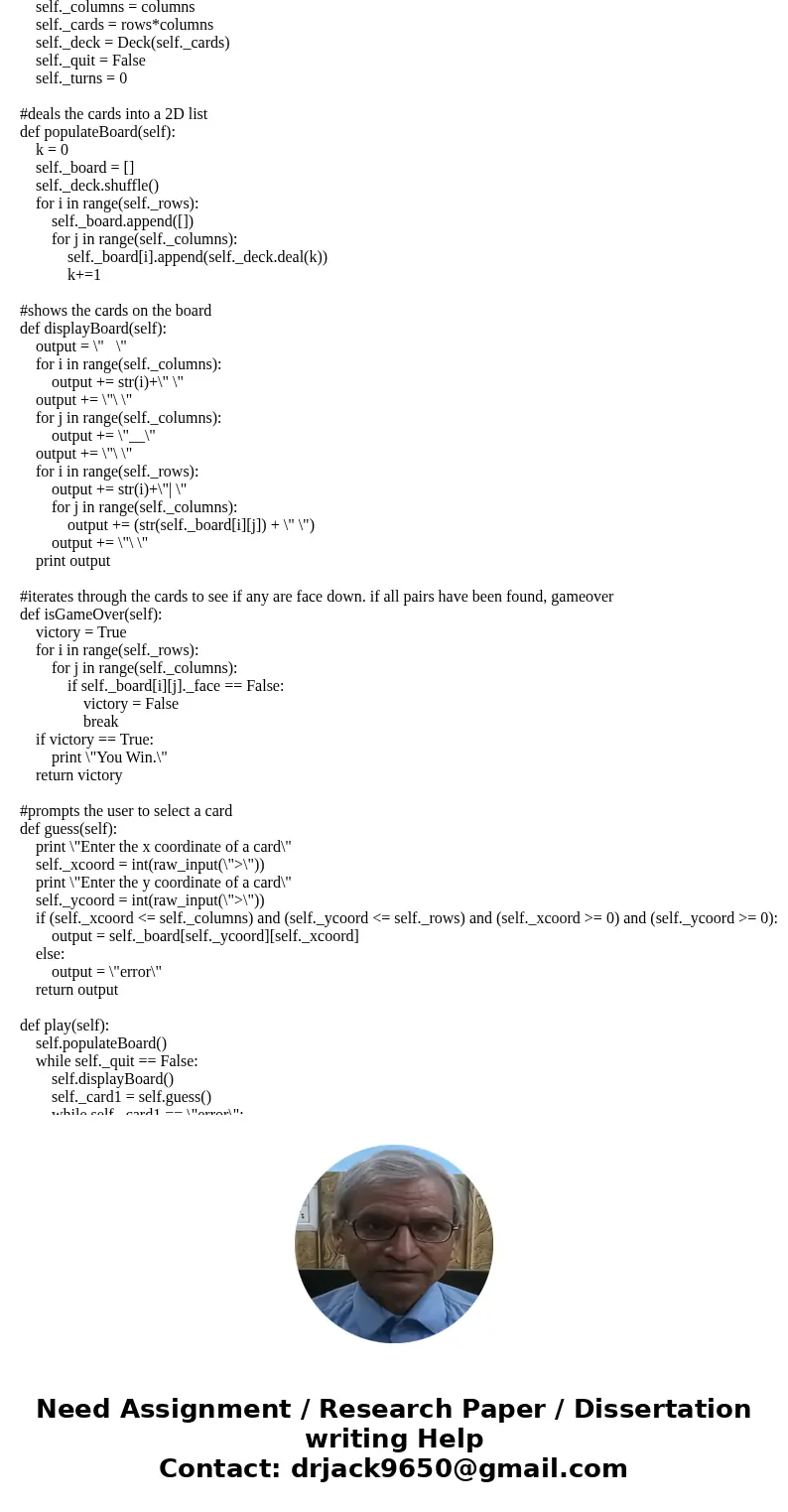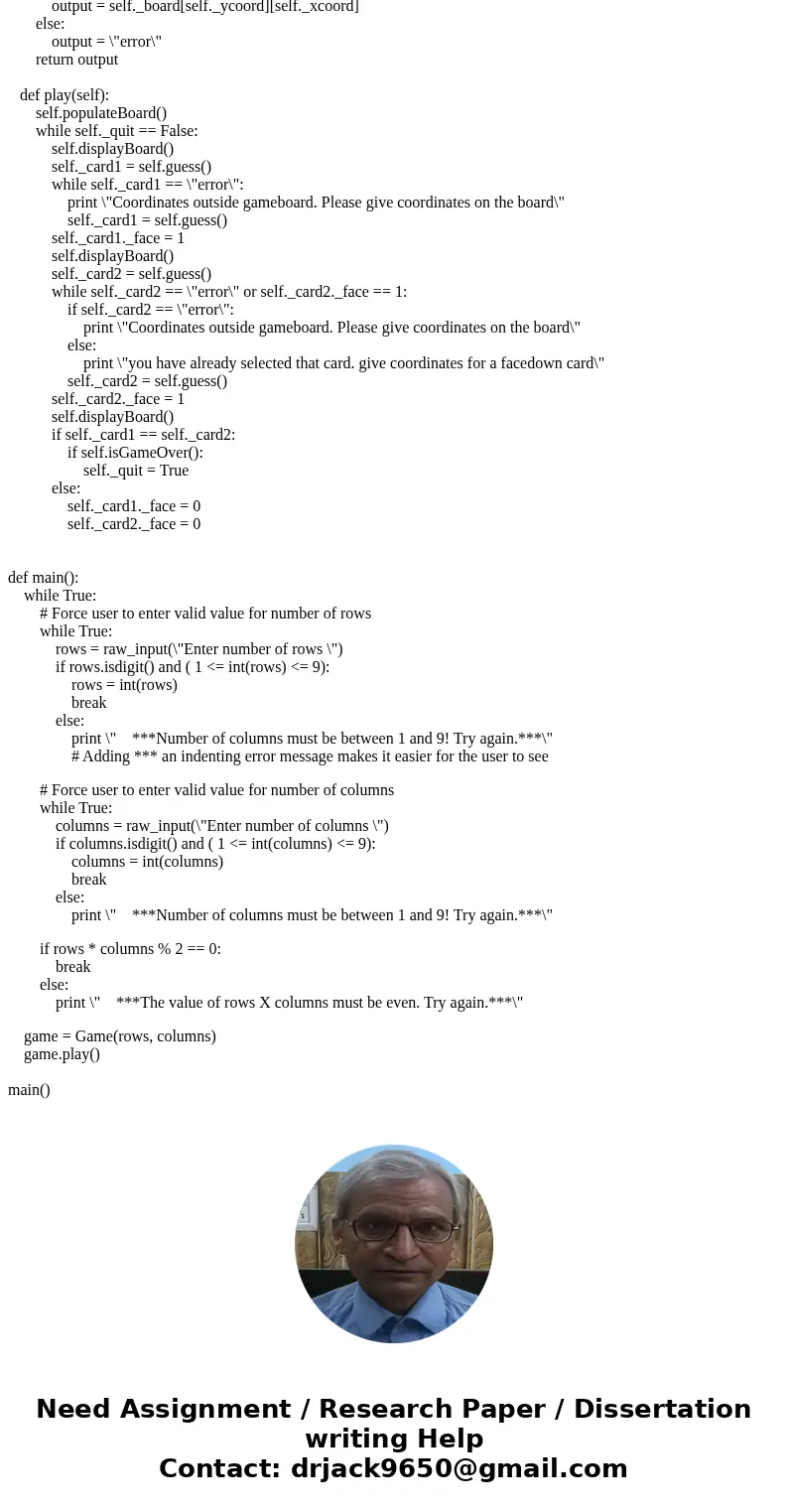This is python 3 Design Requirements You need to use three c
This is python 3.
Design Requirements: You need to use three classes: Card, Deck and Game. Card stores both the card\'s value and face (a string or Boolean variable to indicate whether the card is facing up or down). Deck contains the cards needed for the game. It will contain among its methods a method to deal a card, another for shuffling the deck, and a method that returns number of cards left in the deck. These two classes are not identical to the classes Card and Deck discussed in the book but have many things in common. The class Game simulates playing a single game and represents the interaction between the user and the other classes. Its instance members store a 2D list (of card objects) representing the game board where the cards are placed, number of rows and number of columns of the game board. Among the instance methods of the Game class: play(), which simulates playing the game; isGameOver(), which checks whether or not the game is over; displayBoard(), which displays the board; populateBoard(), which creates the initial 2D list of identical pairs of cards with all the cards facing down. Most probably, you will need to write other instance methods as you see appropriate.
Sample run is as follows:
Solution
import random
class Card(object):
def __init__(self,value):
self._face = 0
self._value = value
def __str__(self):
if self._face == True:
output = str(self._value)
else:
output = \"*\"
return output
def __eq__(self,other):
if type(self)!=type(other):
output = False
elif self._value == other._value:
output = True
else:
output = False
return output
class Deck(object):
def __init__(self,cards):
self._pairs = cards/2
self._cards = []
for i in range(self._pairs):
self._cards.append(Card(i))
self._cards.append(Card(i))
def shuffle(self):
random.shuffle(self._cards)
def deal(self,index):
return self._cards[index]
def cardsleft(self):
return len(self._cards)
class Game(object):
def __init__(self,rows,columns):
self._rows = rows
self._columns = columns
self._cards = rows*columns
self._deck = Deck(self._cards)
self._quit = False
self._turns = 0
#deals the cards into a 2D list
def populateBoard(self):
k = 0
self._board = []
self._deck.shuffle()
for i in range(self._rows):
self._board.append([])
for j in range(self._columns):
self._board[i].append(self._deck.deal(k))
k+=1
#shows the cards on the board
def displayBoard(self):
output = \" \"
for i in range(self._columns):
output += str(i)+\" \"
output += \"\ \"
for j in range(self._columns):
output += \"__\"
output += \"\ \"
for i in range(self._rows):
output += str(i)+\"| \"
for j in range(self._columns):
output += (str(self._board[i][j]) + \" \")
output += \"\ \"
print output
#iterates through the cards to see if any are face down. if all pairs have been found, gameover
def isGameOver(self):
victory = True
for i in range(self._rows):
for j in range(self._columns):
if self._board[i][j]._face == False:
victory = False
break
if victory == True:
print \"You Win.\"
return victory
#prompts the user to select a card
def guess(self):
print \"Enter the x coordinate of a card\"
self._xcoord = int(raw_input(\">\"))
print \"Enter the y coordinate of a card\"
self._ycoord = int(raw_input(\">\"))
if (self._xcoord <= self._columns) and (self._ycoord <= self._rows) and (self._xcoord >= 0) and (self._ycoord >= 0):
output = self._board[self._ycoord][self._xcoord]
else:
output = \"error\"
return output
def play(self):
self.populateBoard()
while self._quit == False:
self.displayBoard()
self._card1 = self.guess()
while self._card1 == \"error\":
print \"Coordinates outside gameboard. Please give coordinates on the board\"
self._card1 = self.guess()
self._card1._face = 1
self.displayBoard()
self._card2 = self.guess()
while self._card2 == \"error\" or self._card2._face == 1:
if self._card2 == \"error\":
print \"Coordinates outside gameboard. Please give coordinates on the board\"
else:
print \"you have already selected that card. give coordinates for a facedown card\"
self._card2 = self.guess()
self._card2._face = 1
self.displayBoard()
if self._card1 == self._card2:
if self.isGameOver():
self._quit = True
else:
self._card1._face = 0
self._card2._face = 0
def main():
while True:
# Force user to enter valid value for number of rows
while True:
rows = raw_input(\"Enter number of rows \")
if rows.isdigit() and ( 1 <= int(rows) <= 9):
rows = int(rows)
break
else:
print \" ***Number of columns must be between 1 and 9! Try again.***\"
# Adding *** an indenting error message makes it easier for the user to see
# Force user to enter valid value for number of columns
while True:
columns = raw_input(\"Enter number of columns \")
if columns.isdigit() and ( 1 <= int(columns) <= 9):
columns = int(columns)
break
else:
print \" ***Number of columns must be between 1 and 9! Try again.***\"
if rows * columns % 2 == 0:
break
else:
print \" ***The value of rows X columns must be even. Try again.***\"
game = Game(rows, columns)
game.play()
main()



 Homework Sourse
Homework Sourse